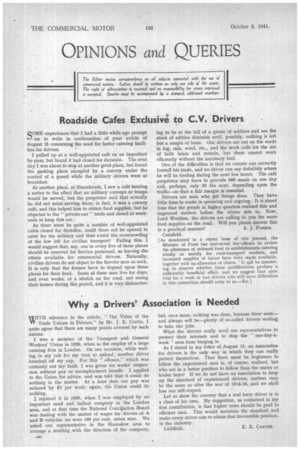OPINIONS and QUERIES
Page 22

If you've noticed an error in this article please click here to report it so we can fix it.
Roadside Cafes Exclusive to C.V.Drivers
QOME experiences that I had a little while ago prompt 6-1 me to write in confirmation of your article of August 15 concerning the need for better catering facilities for drivers.
I pulled up at a well-appointed café on an important by-pass, but found it had closed for duration. The next day I was about to stop at another good place, but found the parking place occupied by a convoy under the control of a guard while the military drivers were at breakfast.
At another place, at Sharnbrook. I saw a café bearing a notice to the effect that no military convoys or troops would be served, but the proprietor said that actually he did not mind serving them; in fact, it was a convoy café, and this helped him to obtain food supplies; but he objected to the' private-car" trade and closed at weekends to keep this out.
" As there must be quite a number of well-appointed cafés closed for duration, could these not be opened, to cater for the military and thus avoid the overcrowding ' of the few left for civilian transport? Failing this, I would suggest that, say, one in every five of these places should be reserved for Service personnel, so leaving the others available for commercial drivers. Naturally, civilian drivers do not object to the Service men as such. It is only that the former have to depend upon .these places for their food. Some of these men live for days, and even weeks, at a stretch on the road, not seeing their homes during this period, and it is very dishearten ing to be at the tail of a queue of soldiers and see the stock of edibles diminish until, possibly, nothing is left but a couple of buns. Our drivers are out on the roads in fog, rain, wind, etc., and the work calls for the use of both brain and muscle, but these cannot work efficiently without the necessary fuel.
One of the difficulties is that no caterer can .correctly foretell his trade, and no driver can say definitely where he will be feeding during the next few hours. The café proprietor may have to provide 500 meals on one day and, perhaps, only 50 the next, depending upon the traffic—so that a fair margin is essential.
Drivers are men who get things done. They have little time to waste in queueing and arguing. It is about time that the people in higher quarters realized this and improved matters before the winter sets in. Now, Lord Woolton, the drivers are calling to you for more food supplies on the road. Will you please answer this
in a practical manner? A. J. PARRIS. Cranfield.
[As mentioned in a recent issue of this journal, the • Minister of Food has instructed his officers to review the allowance of rationed food to establishments catering wholly or mainly for road-transport' workers, and increased supplies of bacon have been made available, together with an allowance of cheeie. It will be interesting to observe whether these modifications produce a sufficiently beneficial effect, and we suggest that after trial for a week or two drivers who still have difficulties in this connection should write to us.—En.]




























































